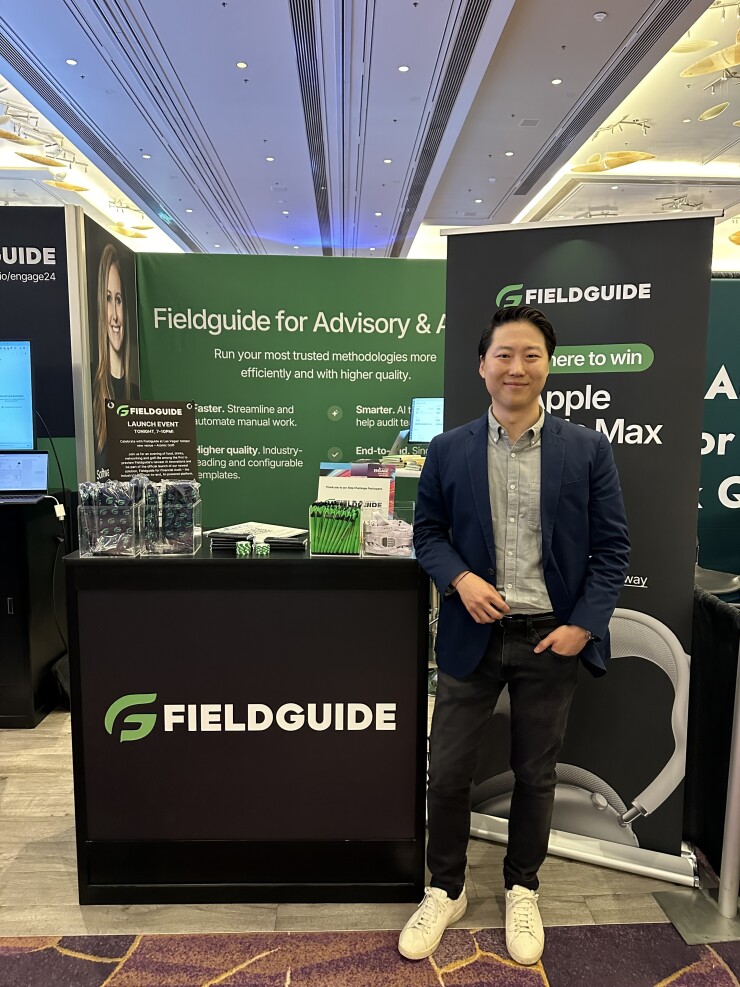Assurance and advisory platform
Fieldguide CEO Jin Chang, in an interview, said it sports the same end-to-end AI platform as the company's advisory solution, but the model is tuned specifically to the financial audit practitioner. While auditors are no stranger to Fieldguide, Chang said that, up until now, "our bread and butter" has revolved around IT and risk engagements versus the financial audit. The new solution represents expansion into this area.
"We have more AI and automation, workflow automation, features specifically tailored for financial audits. For example, when a CPA firm uploads or injects a trial balance, we do an automated mapping to the chart of accounts. Previously we didn't have that automation, but with the trial balance mapping feature firms can map the chart of accounts within seconds," said Chang.

He said the platform is designed so the workflow and engagement lifecycle will feel very familiar to the average CPA. Fieldguide's new product automates the highly manual and error-prone parts of the engagement, such as designing audit test procedures for a first-time client, automating sample selection for accounts, assessing the quality of audit evidence and annotating and documenting based on the test procedures. However, the AI is not meant to take over parts of the engagement wholesale but instead act as a guide on each step of the process, which is part of Fieldguide's philosophy of always having a human in the loop. "So, human practitioners are prompted to review and validate the quality of the work the AI produces," said Chang.
The decision to expand into this area was driven by their customers, according to Chang. He'd often hear from customers who liked what Fieldguide did in advisory and risk who wanted a similar solution for financial audit. Specifically, auditors would complain about having to use disparate applications at different legs of the audit process, which can be awkward and lead to human error. He said many of Fieldguide's customers are contending with the talent shortage that has affected the entire profession, so the release also speaks to the need for firms to do more with less. An AI-enabled end-to-end solution, according to Chang, can act as a force multiplier allowing firms to do just that.
"So, that talent crisis is definitely driving more and more urgency around finding a game-changing technology solution different than before, and our belief is that bringing that end-to-end engagement lifecycle on one platform brings differentiated results no other solution on the market can offer today," he said.
The AI component itself is not a single model but, rather, several working in concert. This is part of what Chang said is the company's "ensemble AI" approach, which includes generative AI large language models blended with more traditional AI technologies like optical character recognition in order to provide what he said was a "context advantage" that allows the generative AI component to take context from "every crevice and corner of an engagement, not just within the narrow scope of a point solution."
"We're able to marry the best of both worlds and deliver highly tuned outputs and results," he said.
The model was tuned to financial audits through three factors, he said. One was the development team consists of many auditors-turned-software-builders, including Chang himself, who was an EY auditor for five years. This extends beyond the dev team and into its product managers, engineers, product designers, customer support and customer success teams: each one sports former practitioners who can offer domain level expertise. He also noted that Fieldguide has extensive contact with major CPA firms who lent their own expertise to the development as well. Finally, the AI platform was always designed to be very flexible, so tuning the model toward financial audit was not a heavy lift, especially considering the expertise of their staff and partners.
He noted that the AI platform is 100% cloud based, which is really the only way generative AI can be delivered today, as the computing demands would be too much for local devices. He said generative AI cannot be brought into a tech stack of disparate solutions that is a mix of both cloud and on-premise computing, calling it "inherently impossible"; by providing a cloud-based single solution, generative AI can be applied to every part of the process.
Chang said that, through the aforementioned flexibility of its AI platform, Fieldguide plans to eventually make and sell highly specialized models custom-made for both specific tasks and specific customers.
"We employ an ensemble approach by leveraging the best large language models for specific use cases," he added. "Our vision includes fine-tuning LLMs for the CPA industry — in close partnership with CPA firms. We look forward to sharing news about these developments in the near future."





